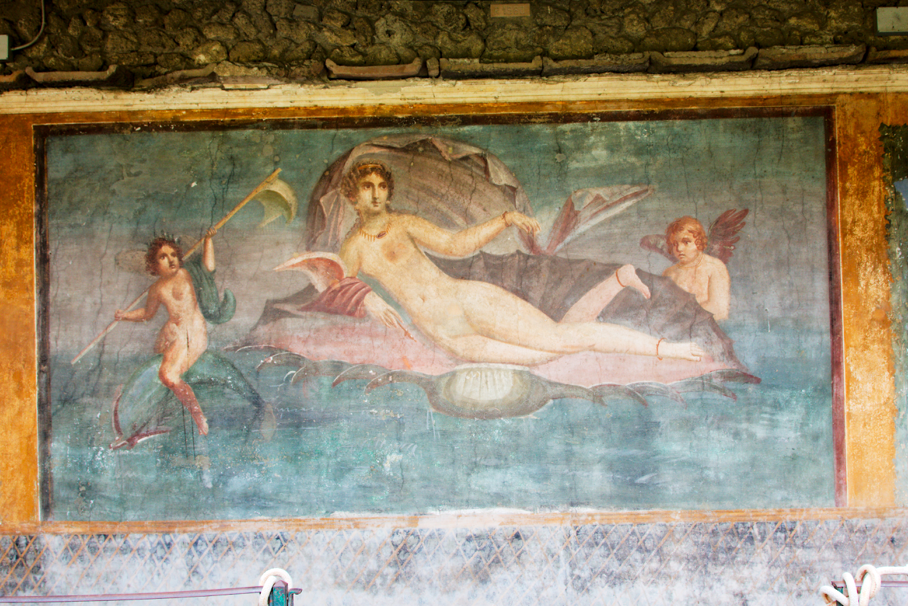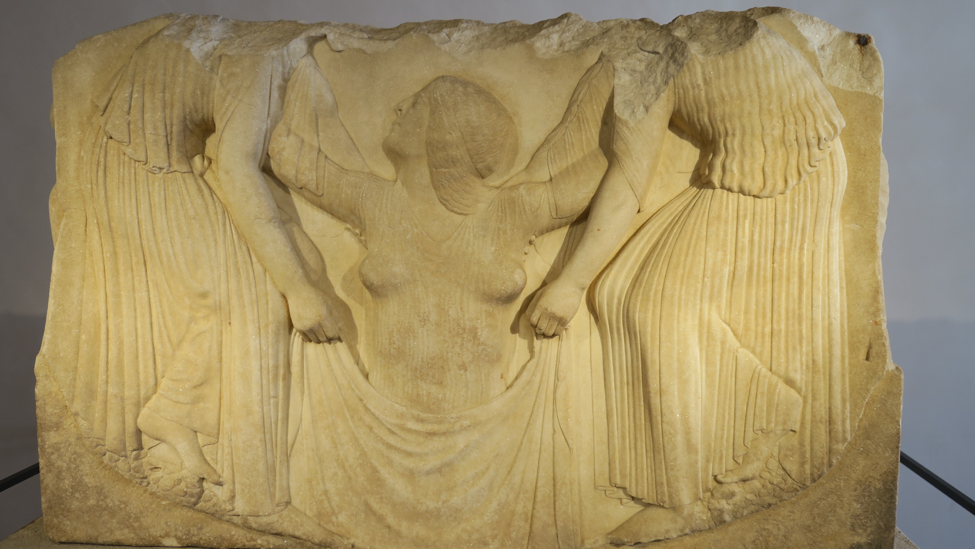Aphrodite
Roman name: Venus
Epithets: Cypris (Lady of Cyprus), Cythereia (Lady of Cythera, an island off the southern coast of the Peloponnese), Paphian (Lady of Paphos, a town on Crete), Urania (Daughter of Uranus), Smile-Loving Goddess, Goddess of Smiles and Deceit
Symbols: doves
Functions: goddess of erotic love and beauty

Two Stories on the Birth of Aphrodite
Aphrodite has two origins. Hesiod says that Aphrodite came from the frothy mix of sea foam and Uranus’ genitals when Cronus dismembered his father [see Origins]. She washed ashore either at the city of Paphos on Cyprus (accounting for her epithets Cypris and Paphian) or on the island Cythera (thus the epithet Cythereia). Paphos was also the site of Aphrodite’s main temple on Cyprus. Homer calls Aphrodite the daughter of Zeus and Dione, who was either a Titan or one of the daughters of Oceanus. The name Dione is also the feminine form of Zeus’ name.

Aphrodite’s Unhappy Marriage
Aphrodite was married to the blacksmith god, Hephaestus, but the two never had any children. This is not to say Aphrodite never had children, in fact, she had several children from her long-standing affair with the war god, Ares. Together they had Harmonia (who was married to the Theban King, Cadmus), Eros (known as Cupid in Latin), Phobus (Panic), and Deimus (Fear). Hephaestus was not happy when he learned of this affair and trapped the lovers in a net [see Hephaestus].
Aphrodite and Adonis
Aphrodite also had notable mortal lovers, including Adonis and Anchises. Adonis was a handsome young man and Aphrodite fell deeply in love with him. Persephone was also in love with Adonis, so they went to Zeus to decide who would have the youth’s love [see Persephone]. Zeus split Adonis’ time into three parts. He gave one part to each goddess and one to Adonis himself to decide where to spend it. Adonis chose to spend his portion of the year with Aphrodite. The deal did not last long though, because Adonis was quite fond of hunting. On a boar hunt, he was gored by the animal and died. Aphrodite was distraught, and she induced an anemone to grow from Adonis’ blood.
Aphrodite and Anchises
Anchises was a young Trojan nobleman who tended to herds on Mount Ida. Zeus was angry at Aphrodite for making the gods, especially himself, fall in love with mortals and make fools of themselves pursuing them, so he caused Aphrodite to fall madly in love with Anchises. After she consummated her love for Anchises, Aphrodite made him promise never to tell anyone they slept together, on pain of a thunderbolt from Zeus. (This story is told in the Homeric Hymn to Aphrodite.) But apparently, Anchises could not keep his promise. The next time we see Anchises, in the Aeneid, he is lame from having been struck by Zeus’ thunderbolt. Anchises clearly did not die from this punishment, but he seems to have been crippled for the rest of his life. The product of their union was Aeneas, whom Aphrodite saved from death multiple times during the Trojan War.
Aphrodite’s Anger
Like other gods, Aphrodite would punish anyone, mortal or god, for slights against her. Theseus’ son Hippolytus became a devotee of the virgin goddess, Artemis, and thus shunned the pleasures of the flesh. This angered Aphrodite, who felt that Hippolytus did not worship her sufficiently. To get back at Hippolytus, she caused his death by making his step-mother, Phaedra, fall in love with him [see Theseus]. She also punished Eos (the goddess of the dawn) for having an affair with Ares by making her fall in love with mortal after mortal.
In a story not seen until the Roman period, Venus hounded the beautiful girl, Psyche, just for being beautiful. Psyche (whose name means “soul” in Greek) was so beautiful that the people around her worshipped her instead of Venus. Psyche did not ask for this worship, but Venus wanted to punish her anyway. Venus sent her son Cupid to shoot Psyche with his arrows and make her fall in love with some hideous beast. This didn’t go according to plan, though, and Cupid fell in love with Psyche himself. Cupid hid Psyche in his palace, not telling her who he was, until she learned his identity through a trick. In his anger at being tricked, Cupid threw her out of his house. Psyche wandered around Greece until she came to a temple of Venus and submitted herself to Venus’ wrath. Venus gave her several impossible tasks, like sorting a large pile of grain in one night or bringing back a jar of water from the Styx. Venus gave her these tasks hoping she would fail, but the world helped Psyche along the way. Some ants helped her sort the grain, and an eagle took the jar and filled it with water from the Styx for her. After Psyche had successfully completed these and other impossible tasks, Cupid forgave her for her deceit. He then brought her to Jupiter, who put an end to the enmity between Psyche and Venus and allowed Cupid and Psyche to marry. This story is told in The Golden Ass by Apuleius.
The Origin of Aphrodite
Aphrodite originally began as a fertility goddess and had close connections with other Near Eastern fertility goddesses such as Astarte, Cybele, and Ishtar. At one point, these may all have been the same goddess. Aphrodite’s main centers of worship were on Cyprus, an island that served as a crossroads between Greece and the Near East, and in Near Eastern sites. Her eastern origins may explain why she favored the Trojans during the Trojan War.

